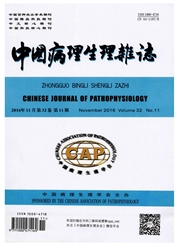

 中文摘要:
中文摘要:
目的:探讨急性冷应激对大鼠学习记忆和tau蛋白磷酸化的影响,tau蛋白磷酸化的变化与学习记忆问是否存在相关性。方法:本实验采用电跳台法测试急性冷应激后不同时点的大鼠记忆成绩;免疫印迹技术测定相应大鼠不同脑区(海马和皮质)tau蛋白过度磷酸化水平,并分析二者是否存在关联。结果:冷应激后20—60min的大鼠学习成绩明显下降,而在90min、120min趋于恢复。同时测得冷应激后20min、40min、60min大鼠的大脑各区tau蛋白过度磷酸化程度逐渐加重,同样在90min亦趋于恢复。结论:冷应激可以引起大鼠学习记忆能力短暂降低,而且伴随着神经骨架蛋白tau磷酸化增强,提示tau蛋白磷酸化水平在学习记忆形成过程中起着重要作用。
 英文摘要:
英文摘要:
AIM: To explore the effect of cold water stress (CWS) on memory and tau phosphorylation in rat and their relationship. METHODS : Step - down test was used to measure the memory performance in rats at different time points after suffering from cold water stress. Levels of phosphorylated tau in different brain regions of rat subjected to CWS were detected by using immunoblotting. The relationship between memory and phosphorylated tau in rats was studied. RESULTS: The memory record of the rat obviously decreased from the 20 to 60 min after CWS, while trending to recover at the 90 and 120 min. At the same time, the levels of phosphorylated tau in different brain regions (hippoeampus and cortex) in rat gradually increased at the 20, 40 and 60 min then was apt to recover at the 90 and 120 min. CONCLUSION: Cold water stress induces transient memory decrease in rat and corresponding increase in tau phosphorylation. It implies that tau phosphorylation may play a key role in memory formation in rat.
 同期刊论文项目
同期刊论文项目
 同项目期刊论文
同项目期刊论文
 期刊信息
期刊信息
